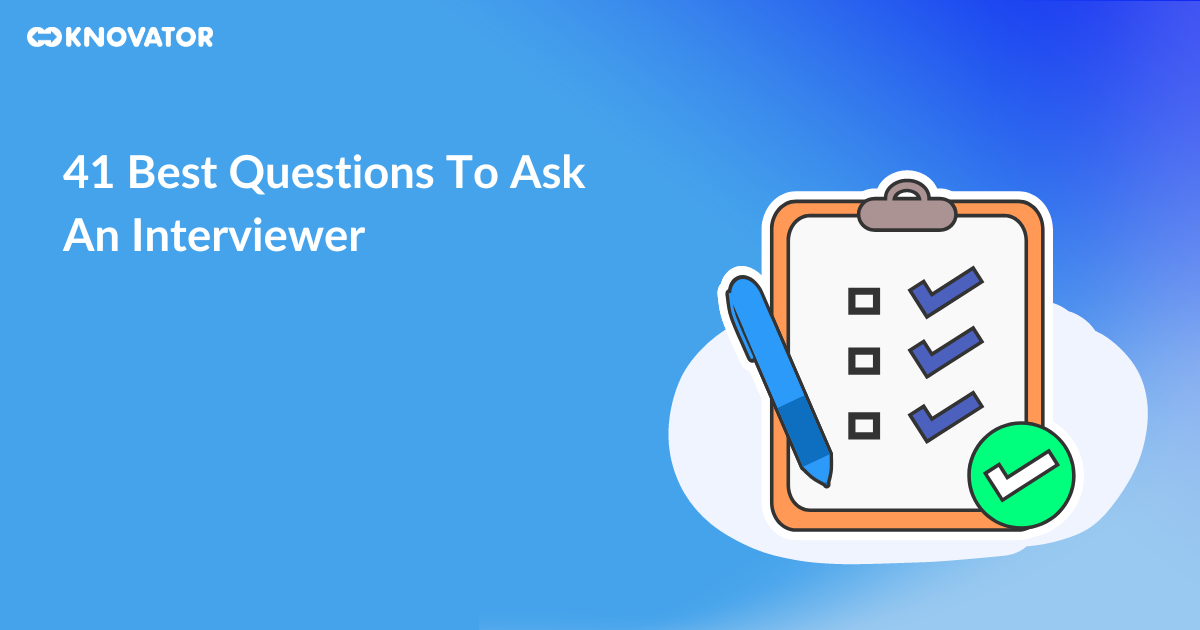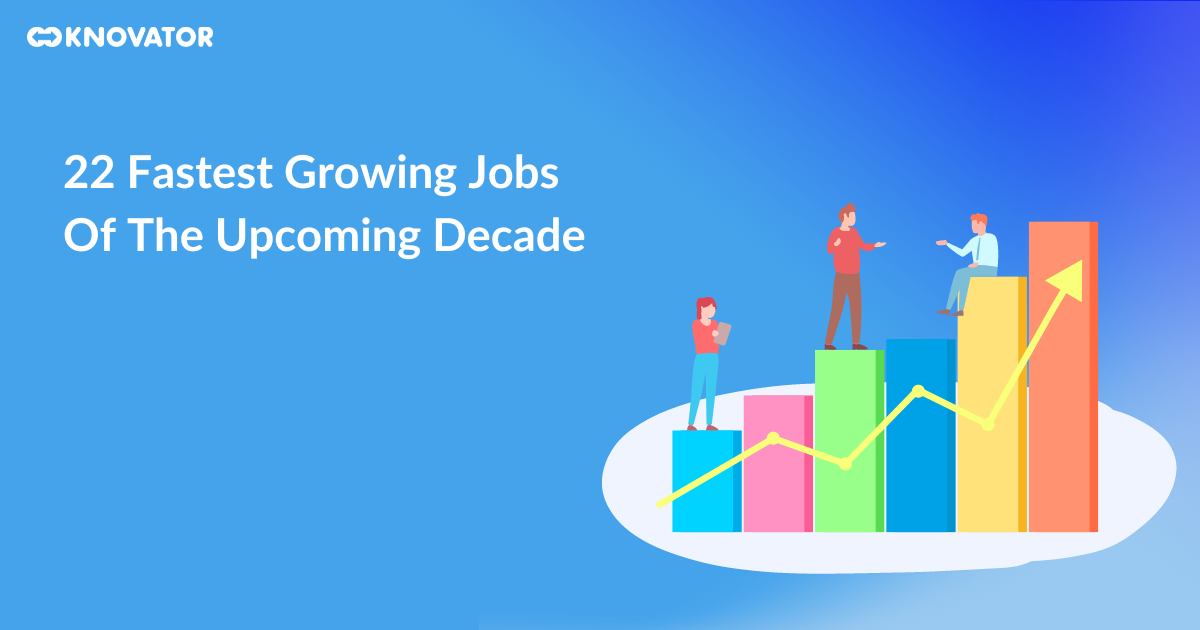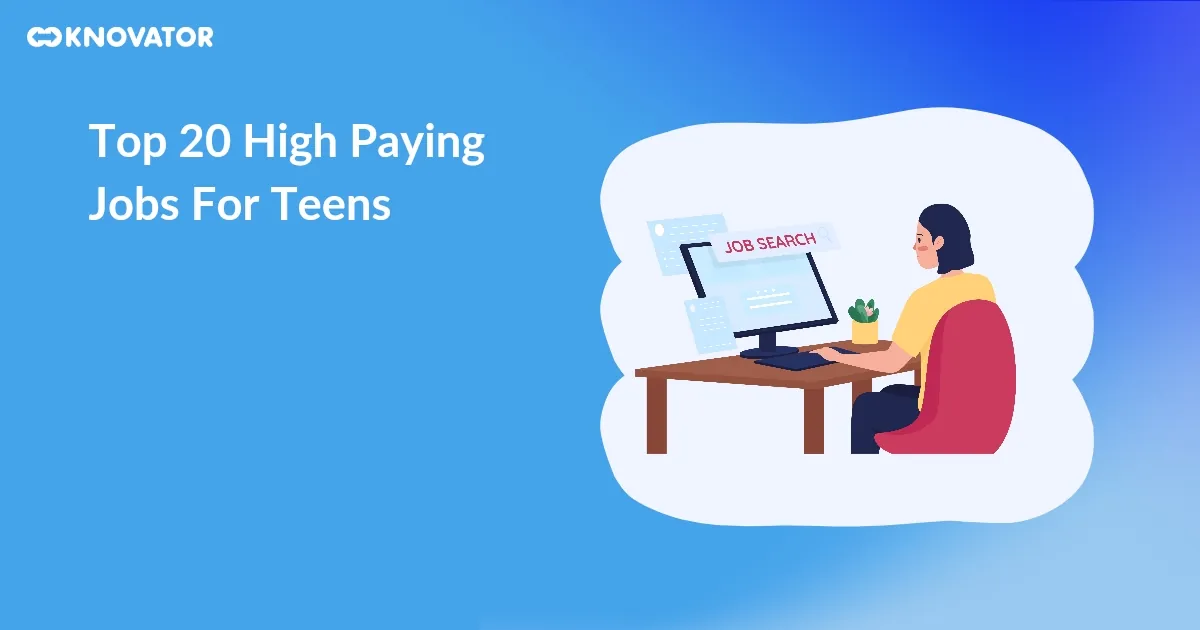Are you aware that acing an interview is a two-way street? The interviewer assesses your skills and experience to see if you fit the role well. You’re also evaluating the company and the team to see if it’s the right place for you. Asking thoughtful questions during the interview is a great way to gather information. It also showcases your interest and leaves a lasting impression.
Don’t know where to start? We are there for you!
This blog post will provide 41 insightful questions to ask an interviewer. We have categorized the questions into different sections to help you prepare for your next job interview. These questions cover topics such as learning more about the role and the team. They also help you understand the company culture and growth opportunities. You can show your genuine interest in the position by asking thoughtful questions and you can gain important insights to help you decide if the company fits you.
Guidelines for Asking Questions
 1. Ask One Question at a Time
1. Ask One Question at a Time
Asking many questions in a single query can confuse the recipient and make it challenging to provide a focused response. By asking one question at a time, you ensure clarity and allow for a more thorough answer.
2. Your question should have one specific point
Similar to asking one question at a time, this guideline emphasizes the importance of clarity and focus. A question with a single specific point is easier to understand and address effectively.
3. Avoid “Yes” or “No” Questions
“Yes” or “No” questions often lead to brief, uninformative answers and limit the depth of conversation. Open-ended questions encourage discussion, exploration, and exchanging ideas, leading to better interactions.
Questions to ask about the job
 1. What attributes does a person need to have to be really successful in this position?
1. What attributes does a person need to have to be really successful in this position?
This question shows that you focused on understanding the specific qualities and traits that value the role. It allows you to align your strengths and experiences with the expectations of the position, giving you the chance to highlight relevant skills during the interview.
2. Which specific skill sets are you looking to add to the team with a new hire?
By asking this question, you demonstrate your interest in the team dynamics and how you can contribute to filling any skill gaps. It also provides insight into what the team values and where they see growth opportunities, allowing you to position yourself as a solution to their needs.
3. What are the biggest challenges that a person in this position would face?
This question shows your understanding of the potential obstacles and complexities of the role. It allows you to assess whether you have the skills and experience to overcome these challenges while demonstrating your problem-solving abilities and adaptability. It also gives you a realistic understanding of what to expect in the role, helping you determine if it is set with your career goals and capabilities.
Questions to ask about the specific job
 1. What kind of a career path would someone in this role take?
1. What kind of a career path would someone in this role take?
This question helps you to understand potential opportunities for growth and advancement within the company. Knowing the career trajectory can give insight into the potential for skill development, promotions, and increased responsibilities, which are essential for long-term career planning.
2. Will the responsibilities of this job change over the next year?
This question is important for understanding the dynamic nature of the role and how it aligns with your skills and career goals. Knowing about potential changes in responsibilities can help you to prepare for future challenges and opportunities. It also shows that you are proactive and interested in staying on a level of developments within the company.
3. How does this role contribute to the company’s overall success?
This question shows initiative and a desire to understand your impact. It reveals the role’s significance within the bigger picture. It helps you assess if it aligns with your values and desired contribution. When you understand how your work impacts the company’s success, you’ll be more motivated and engaged. This leads to better performance and a beneficial relationship.
Questions About the Position
 1. How will you measure the success of the person in this position?
1. How will you measure the success of the person in this position?
This question shows your eagerness to excel and helps you understand what the company values most. By knowing how they measure success, you can see if your skills and experience are a good fit.
2. What are the challenges you expect the person in this position to face?
Knowing the challenges upfront allows you to see if you have the right skills to tackle them. It’s also a chance to show your problem-solving skills by talking about how you might approach those difficulties.
3. Can you describe a typical day or week in the job?
This question gives you a realistic idea of what the job is actually like, day-to-day. It helps you see if the daily tasks align with your interests and work style, and if you have the skills they need to get things done.
Questions to ask about the team
 1. I would like to know more about the team I will be working with.
1. I would like to know more about the team I will be working with.
This question helps you to understand the team’s composition, including its size, roles, expertise, and culture. It gives you a glimpse into their day-to-day interactions and whether they would fit well within the team dynamics.
2. Who directly oversees my team?
Knowing who directly oversees the team provides clarity on reporting lines. It helps you understand who they would be working closely with and who would be responsible for their performance evaluation and career development within the team.
3. How are team members recognized for a job well done?
You need to understand the company’s practices for recognizing employees. This will help you assess whether they acknowledge and appreciate employees’ efforts and achievements. It also gives insight into the company culture and values. It shows how the company motivates and engages employees.
4. Do you plan to hire more people for this team in the near future?
This question helps you to gauge the growth potential of the team and the company. Knowing about future hiring plans indicates potential opportunities for advancement within the team and whether the team is expanding or stable.
5. Which other teams work closely with this one?
Collaboration is often key to success in most of the roles. Understanding which other teams work closely with the team you’re considering joining can give insight into cross-functional interactions, dependencies, and the overall scope of the role. It also helps you to understand how integrated their work might be with other parts of the organization.
Questions to consider regarding professional development and training
1. What educational and career-development options are offered to your staff members?
This broad question opens the door to understanding the company’s approach to fostering growth. It includes formal training programs, workshops, conferences, or mentorship opportunities.
2. Will there be opportunities where I can learn and use new skills?
This inquiry shows your proactive approach to continuous learning. It aligns your desire for skill development with the specific role and its potential for growth.
3. Are there opportunities for advancement within the company?
Understanding the company’s promotion policies and internal talent development practices allows you to assess if your career goals align with the available growth trajectories.
Common inquiries regarding the criteria used to assess your success
1. What is the performance review process like here?
This question helps you to understand the overall structure and format of performance evaluations within the company. It provides insight into whether the process structure is feedback-oriented or more informal. Understanding the whole process can help you to prepare and align your efforts accordingly.
2. How often would I be formally reviewed?
Knowing the frequency of formal performance reviews allows you to gauge how often you’ll receive feedback on your work and progress. It also sets expectations about when the management will assess your performance and make necessary adjustments.
3. What benchmarks or objectives will be used to assess my performance?
This question is crucial. It clarifies the specific criteria against which your performance will be measured. Understanding the metrics or goals provides transparency. It enables you to focus your efforts on the areas that matter most to the organization. It also ensures alignment between individual goals and broader company objectives.
Questions to ask about the interviewer
 1. How long have you been with the company?
1. How long have you been with the company?
This question helps you to understand the tenure and possibly the loyalty of employees within the company. It can provide insight into the company’s retention rate. It can also show whether employees find it fulfilling.
2. Why did you come to this company?
Understanding the interviewer’s motivation for joining the company can provide valuable information about the company’s values, culture, and opportunities. It can also give you a sense of what attracts top talent to the organization.
3. What is your favorite part about your job?
This question allows you to learn more about the interviewer’s experiences. It also lets you find out what they find rewarding about working for the company. It can give you a glimpse into the positive aspects of the company culture. It can also show you the types of roles available within the organization.
4. Has your role changed since you’ve been here?
Learning about the interviewer’s career progression and any changes in their role can provide insights into potential opportunities for growth and development within the company. It demonstrates the company’s willingness to invest in its employees’ professional advancement.
Questions to ask about the company
 1. What are the company’s current priorities, and how does this team collaborate to help achieve them?
1. What are the company’s current priorities, and how does this team collaborate to help achieve them?
This question is crucial for you to understand the immediate priorities and direction of the company. It gives insight into the company’s short-term strategies and how the team fits into achieving those objectives. Understanding these goals help you gauge the company’s needs.
2. What gets you most excited about the company’s future?
Asking about what excites the interviewer or other employees about the company’s future gives you a glimpse into the company’s vision, innovation, and potential for growth. It also shows the company culture. It reveals if the team is enthusiastic and optimistic. You can assess if the company’s future aligns with their career aspirations. You can also assess if they would find fulfillment and motivation in contributing to its success.
3. What are the company’s most important values?
Understanding a company’s values provides insight into its culture, decision-making processes, and how it treats employees, customers, and stakeholders. By asking about the company’s values, you can assess cultural fit. You can also determine if their values align with the organization’s. You also signal to the interviewer that you have an interest in a positive work environment. It also signals that you want to contribute to a company that shares their principles and beliefs.
Questions Related to Duties and Requirements
 1. What’s the most important thing I should accomplish in the first 90 days?
1. What’s the most important thing I should accomplish in the first 90 days?
This question shows your proactive approach. It also demonstrates your interest in making an immediate impact in the role. By understanding what the hiring manager or employer considers the most critical objectives for the first 90 days, you can align with their efforts. You can focus on achieving those goals. It also helps set expectations. It provides insight into the company’s priorities and performance metrics.
2. How much travel is expected?
This question is crucial for you. You have concerns about how travel commitments will impact your work-life balance or personal circumstances. Understanding the extent of travel expected allows you to assess whether you can meet requirements. It also helps you make necessary arrangements if needed. It also helps you gauge the role’s nature. For example, does it involve client meetings, industry conferences, or site visits? These factors can impact your decision to pursue the opportunity.
3. Is it possible to relocate?
You may have questions about relocating for the job or have location preferences. By asking about relocation possibilities, you can determine if the company offers help or incentives for relocation. You can also find out if the company is willing to consider you outside the local area. This question also indicates your willingness to consider opportunities beyond their current location. It shows your commitment to exploring possibilities that align with your career goals.
Creative questions to ask about the Company culture
 1. What is the company and team culture like?
1. What is the company and team culture like?
This question allows you to understand the company’s overarching culture and how it translates to the team level. It explains whether the company values innovation, collaboration, diversity, or other cultural aspects.
2. Are there employee resource groups?
Employee resource groups (ERGs) can indicate a company’s commitment to diversity, equity, and inclusion. Your interest in knowing if there are support systems in place for different demographic groups or shared interests.
3. How would you describe the work environment here—is the work more collaborative or more independent?
You want to know the dynamics of the work environment to assess if it aligns with your preferred working style. Understanding whether the company fosters collaboration or independence can help you to determine if you’ll thrive in that environment.
4. How would you describe the work environment for the team/company?
This question allows you to gain deeper insights into the day-to-day atmosphere within the team or company. It can reveal whether the environment is fast-paced, laid-back, high-pressure, or supportive. This is crucial for you to assess your fit.
5. How does the team build and maintain strong bonds?
Building strong bonds within a team can foster collaboration. It can also foster innovation and a positive work environment. You want to know if the company prioritizes team cohesion. You also want to know how they facilitate it because it can impact job satisfaction and productivity.
6. How are high performers recognized and rewarded?
You want to understand how your contributions are acknowledged and rewarded within the company. Knowing if high performance is recognized through promotions, bonuses, awards, or other incentives can influence your decision to join the organization.
Questions not to bring up during a job interview
1. What does [Company] do exactly?
Avoid this question during a job interview. It indicates a need for more basic research and understanding of the company. It suggests to the interviewer that you need to take the time to familiarize yourself with the organization’s products, services, or mission. Asking this question from your perspective can come across as unprepared and disinterested. It might diminish your credibility as a candidate.
2. When is my PTO?
During a job interview, avoid this question. It focuses on benefits rather than the job’s responsibilities and requirements. You may be more concerned about time off than contributing to the company’s goals and objectives. From your perspective, asking about PTO too early in the interview can convey a lack of priorities. It may signal to the employer that you’re more interested in perks than job responsibilities.
One Step At A Time
This is an excellent list of insightful sample questions to ask an interviewer! It covers many topics. This provides a well-rounded understanding of the role, the team, the company culture, and growth opportunities.
Remember, asking thoughtful questions is a crucial part of any successful interview. It demonstrates your genuine interest in the position. It also allows you to gather valuable information. Plus, it helps you determine if the company is a good fit for you. Follow these guidelines. Use the provided questions as inspiration. This will ensure your next interview is a positive and informative experience.

 1. Ask One Question at a Time
1. Ask One Question at a Time 1. What attributes does a person need to have to be really successful in this position?
1. What attributes does a person need to have to be really successful in this position? 1. What kind of a career path would someone in this role take?
1. What kind of a career path would someone in this role take? 1. How will you measure the success of the person in this position?
1. How will you measure the success of the person in this position? 1. I would like to know more about the team I will be working with.
1. I would like to know more about the team I will be working with. 1. How long have you been with the company?
1. How long have you been with the company? 1. What are the company’s current priorities, and how does this team collaborate to help achieve them?
1. What are the company’s current priorities, and how does this team collaborate to help achieve them? 1. What’s the most important thing I should accomplish in the first 90 days?
1. What’s the most important thing I should accomplish in the first 90 days? 1. What is the company and team culture like?
1. What is the company and team culture like?




